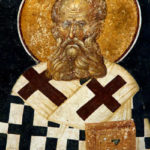We run our website the way we wished the whole internet worked: we provide high quality original content with no ads. We are funded solely by your direct support. Please consider supporting this project.

Divine Accommodation and the Cross: where Calvin was onto something
Over the last few posts, I’ve been arguing that the cross represents the thematic center of everything Jesus was about. Hence, rather than striving to have a “Christocentric” theology — which is so broad it means next to nothing—we ought to sharpen our focus by striving for a “cruciform” theology. I then offered some suggestions about how adopting a cruciform perspective might adjust our understanding of biblical inspiration.
Beginning today, I’d like to reflect on how a cruciform perspective might affect our understanding of “divine transcendence” and “divine accommodation.” The former is usually understood to refer to God as he is in himself, apart from his relation to creation. The latter refers to various ways God has had to adjust his appearance in order to communicate to us, given that our brain capacity is so limited, and our hearts so tainted with sin. The two are inseparable inasmuch as the second presupposes the first. That is, we could only recognize that God is accommodating himself in a given passage if we already know something about what God is like in himself, when he’s not accommodating.
I thought it might be fun to start my reflections on this topic with John Calvin, since he used the concept of accommodation more than anyone else in church history. Everyone assumes I don’t like brother John, but it’s not true. Well, maybe a little. I’ll readily admit that I find aspects of his doctrine of God, especially as it concerns “election” and “reprobation,” to be utterly horrific. I should also acknowledge that what I’ve learned about his personal life, especially the way he treated enemies like Michael Servetus, does little to boost my respect for him. At the same time, however, I want it to be known that I have found much in both his Institutes of the Christian Religion and his massive commentaries that I consider to be very insightful. Seriously.
I find some aspects of his use of the concept of divine accommodation to be helpful. In previous posts I’ve said that to read Scripture through the lens of the incarnation and the cross means we should read it with the awareness that God is a God who stoops to enter into our humanity and bear our sin. Calvin’s use of divine accommodation, at times, points in this direction. For example, regarding the depiction of Yahweh as a warrior waking up with a hangover in Psalm 78:65, Calvin said that this was a divine portrait that was “accommodated to the stupidity of people.” [1] So too, Stephen Benin documents the manner in which Calvin occasionally “pushed his approach [to accommodation] so far as to assert that the Holy Spirit…accommodated itself to vulgar error in order to enhance the meaning of its message,” as when he noted how the Psalmist expressed the erroneous view that cobras could make themselves deaf in Psalms 58:4-5.[2] Most surprising of all, Calvin wasn’t afraid of admitting that some portraits of Yahweh in the OT, such as his commanding his people to mercilessly slaughter defenseless women and children, were “utterly barbaric,” “crude,” “savage,” and “atrocious.” However, Calvin concluded that because it was God who did these things, and because God transcends our moral categories, we must acknowledge these otherwise “atrocious” actions to be “holy.”[3]
What I find intriguing, however, is that as much as Calvin used the principle of accommodation to explain difficult passages, and despite the fact that he was close to affirming that the Holy Spirit is willing to stoop to bear our stupidity and erroneous views, when it came to explaining depictions of God acting violently, Calvin instead appealed to his doctrine that God is above our moral categories (a doctrine which, if you think about it, implies that we have no idea what we mean when we claim God is “good”). Had Calvin placed the cross at the center of his concept of divine accommodation, I believe he could have explained the passages that depict God acting in “crude,” “savage,” and “atrocious” ways without having to say that “crude,” “savage,” and “atrocious” behavior becomes “holy” when applied to God.
Had Calvin made the cross central to his understanding of accommodation, he could have explained these violent portraits of God (as well as a multitude of other embarrassing or difficult passages) the same way he explained passages where the Spirit accommodates our “stupidity” and error. Had Calvin incorporated God’s sin-bearing character into his understanding of accommodation, he could have said what I would say: these violent, “savage” portraits anticipate the cross by pointing to a God who, out of love, stoops to bear the sin of his people, and thus takes on the semblance of a deity that is far less beautiful than he actually is– just as he did on the cross.
[1] Cited in F. C. Battles, “God was Accommodating Himself to Human Capacity,” Interpretation, 31 (1977), 19-38 (35).
[2] S. Benin, The Footprints of God: Divine Accommodation in Jewish and Christian Theology (New York: SUNY, 1983), 195.
[3] See D. F. Wright, “Accommodation and Barbarity in John Calvin’s Old Testament Commentaries,” in Understanding Poets and Prophets: Essays in Honour of George Wishart Anderson, A. G. Auld, ed. (JSOT, Supp. 152: 413-27; Sheffield: Sheffield Academic Press, 1993), 413-27 [427-28]. See also “Calvin’s Pentateuchal Criticism: Equity, Hardness of Hart, and Divine Accommodation in the Mosaic Harmony commentary,” Calvin Theological Journal, 21 (1986), 33-50.
Category: General
Tags: Calvinism, Cruciform Theology, Scripture
Related Reading

Isn’t the Resurrection the Ultimate Revelation of God? (podcast)
Greg considers the relationship between Christ’s death and resurrection. http://traffic.libsyn.com/askgregboyd/Episode_0744.mp3

Podcast: What is ‘Deep Literalism’?
Greg discusses different levels of literalism and does a darn good impersonation of Garth Brooks. http://traffic.libsyn.com/askgregboyd/Episode_0214.mp3

How the Church Fathers Read the OT
After the completion of the New Testament, the church fathers developed theology in their increasingly Gentile post-apostolic church in such a way that many of the distinctively Jewish features of the NT’s use of the OT diminished. However, this was not the case with regard to the Christocentric interpretation of the OT that was so…

Does the Old Testament Justify “Just War”?
Since the time of Augustine, Christians have consistently appealed to the violent strand of the Old Testament to justify waging wars when they believed their cause was “just.” (This is Augustine’s famous “just war” theory.) Two things may be said about this. First, the appeal to the OT to justify Christians fighting in “just” wars…

Modern Theologians and the Centrality of Christ
During the twentieth century the development of a Christocentric reading of the Scriptures—which is crucial to understanding what I argue in Crucifixion of the Warrior God—surged in the wake of Karl Barth’s publication of his Romans commentary in 1916. It was justifiably described as a “bombshell” that fell “on the playground of the theologians,” demolishing…

The Revelation of God in the Cross
The cross cannot be understood apart from the resurrection, just as the resurrection can never be understood apart from the cross. They are two sides of the same coin. If you consider the cross apart from the resurrection, then the crucified Christ becomes nothing more than one of the many thousands of people who were…
